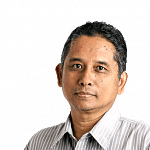In the late 1980s, the oil-and-gas business newspaper that I worked for ran an article by an industry expert who referred to a vital marine lifeline for the global economy as "the Persian Gulf".
The expert was referring to large body of water where some 30 per cent of the world's oil and gas pass through daily in giant tankers as they leave countries such as Saudi Arabia, Iran, Iraq, Qatar and Kuwait.
A few days after the weekly Oil &Gas News was distributed (sold by subscription only), in came a note from the publisher based in Bahrain that we must refer to the channel henceforth as "the Arabian Gulf" in our newspapers.
Never mind what others might call this mass body of water that separates the Iranian plateau from the Arabian peninsula.
I was then the Singapore-based chief sub-editor of the paper and several other trade newspapers the company published and changes were made pronto.
That basic naming dispute has stayed with me all my life as being symptomatic of the huge divide between the Persians (Iranians) and the Arabs.
I read online that the channel was called the Persian Gulf until the 1980s when Arab nationalism rose.
Now more than ever, how the Iranians and the Arabs reduce the gulf between them is important for the world, including Singaporeans, as from this area flows the lifeblood of world economies - oil and gas.
A disruption of supply from this region due to war or political instability could have dire consequences about how much a litre of fuel would cost at that Ang Mo Kio petrol station.
And if the world's economy is shaken - as it was when Iraqi dictator Saddam Hussein invaded Kuwait in August 1990 - it could affect the job stability of Singaporeans.
From the time of the mighty Persian empire to the ayatollahs today, a huge gulf has always separated the Arabs and the Persians.
On one side of the Gulf are the Iranians who are also Shi'ites, and are seen by the other side as being ambitious in expanding its sphere of influence.
On the other, are the Arab nation states - rich with oil and gas and all Sunni-led.
Concurrently, Iran wants to produce nuclear energy, which has alarmed the Western and Arab countries which say the Iranians want to produce nuclear bombs and not just electricity.
Today, these political differences have become militarised in places, with the bloody conflagration in Syria spreading to Iraq and Lebanon.
The intense Syria war, now three years old, has killed over 126,000 people.
And alarmingly, at least 2 million civilians have become refugees.
On Sunday, as I stepped onto the beach of the Gulf for the first time in Kuwait, that naming dispute at my old company came rushing to my mind.
It was cold and windy during this winter season.
Apt weather, I thought, for the chilly political differences that the Arabs and Iranians just could not bridge.
I thought of the cold and bleak conditions of the refugee camps in Syria and how they are coping.
Hopefully, more help will reach them soon.
Kuwait will on Wednesday host the second donor pledging conference for humanitarian help in the Syrian conflict.
UN Secretary-General Ban Ki Moon is expected to be here and hope to raise pledges of US$6.5 billion (S$8.2 billion).
In the first donor conference in January last year, US$1.3 billion were pledged, but there were difficulties in ensuring that the funds pledged were actually banked in.
Concurrent to the humanitarian work, is the fighting in the field.
While the Gulf states are not directly fighting in Syria and it's neighbouring countries, their proxies are.
Iran backs the regime of Bashir Al Assad, the Hezbollah in Lebanon, and the Shi'ite-led government in Iraq.
Alarmed at US dithering over being more involved in Syria and the Middle East, and dovish overtures to Iran, the Arab Gulf states are increasingly taking an active role.
Saudi Arabia and Qatar for instance have allies among the Syria rebels, and wants to curb Iranian influence in the Middle East.
Thus the killings, sadly, will continue.


